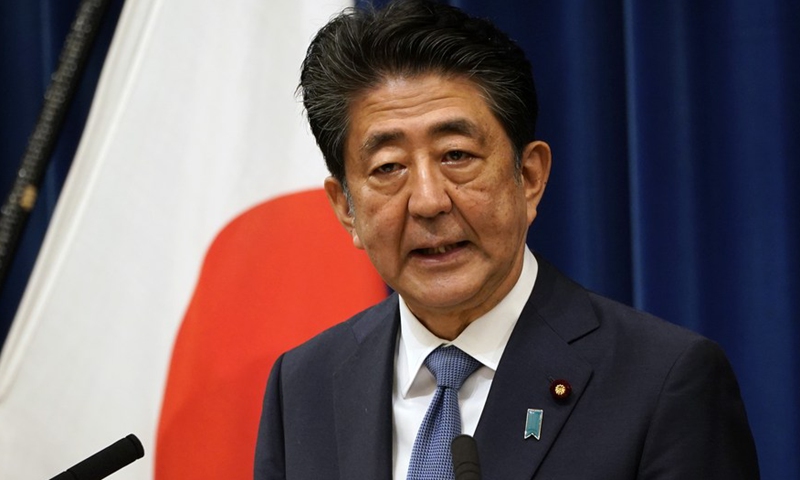Chinese view of Japanese PM shows seismic East Asia change
By Wang Wen Source: Global Times Published: 2020/8/31 15:49:46

Japanese Prime Minister Shinzo Abe speaks during a press conference in Tokyo, Japan, Aug. 28, 2020. (Franck Robichon/Pool via Xinhua)
The resignation of Japanese Prime Minister Shinzo Abe was the biggest August 2020 news for East Asian politicians. Over the past 14 years, Abe's image has changed dramatically in Chinese people's eyes. When he became prime minister for the first time in 2006, China looked to him to ease tensions initiated by his predecessor Junichiro Koizumi. However, his visit to the Yasukuni Shrine and orders to revise history textbooks have caused deep discontent in Chinese society. To many Chinese people, he was a political clown who fell from power like a meteor.When Abe took office again in December 2012 and put forward "Abenomics," there was disdain and criticism in the Chinese media. But the economic data suggested the Japanese economy was picking up, and Abe became the longest serving prime minister in Japanese history. Now in China, Abe is to some extent regarded as a respectable Japanese politician.
One of Abe's most popular stories in China happened when he was asked why he appears so jolly when he fawns over US President Donald Trump. He said that a wise man mends his ways and he does not mind losing face for the sake of the country and its people. This pragmatic answer has won favor in China. The transformation in Chinese people's perceptions of a Japanese prime minister reflects a dramatic shift in the power structure of East Asia. Due to history, it is understandable that Chinese treat their neighbor with historical sentiments. Now Chinese are more confident and moderate because of the increase of China's power.
When Abe took office in 2006, Japan's economy accounted for one-tenth of the world's total, while China's was only 61 percent of Japan's. Now accounting for about 16 percent of the world's total GDP, China's economy is about three times of Japan's.
One cannot help but feel sympathetic to see the decline in the global importance of Japan's economy and its general slump over the past decade. My generation of Chinese grew up with Japanese household appliances of brands such as Panasonic, Toshiba and Hitachi. But now, almost all Japanese brands have withdrawn from the global appliance market. None of the well known smartphone brands come from Japan. This is a far cry from the "Japan represents high-technology" image of the past.
In my opinion, Abe's historical contribution lies in the smooth strategic transition under the historical upheaval of the relative rise of China and relative decline of the US. If Japan is to focus on Asia again in the future, then Abe should be the real starting point.
Abe's strategic ambition is to "normalize" the country through a range of strategies including amending the constitution. However, he was not strong enough to support his ambitions.
Great political heroes need support of not only the times but also the national strength and the consensus of their people. From this perspective, Abe's political status in history is unlikely to trump that of his predecessors such as Eisaku Sato, Kakuei Tanaka and Nakasone Yasuhiro. In other words, he was more of a tragic figure who had his ambitions frustrated.
China is not worried about whether Abe's successor will change China-Japan relations. As long as China continues developing, no matter who succeeds Abe, the general trend of a gradual warming of China-Japan relations should remain stable. Japan has always had the preference of tilting toward the strong. In this respect, it will be the historical trend in which the US withdraws completely from Asia while East Asia integrates with China, Japan and South Korea as the core.
However, the change of power between China and Japan does not mean that China can look down on Japan. I have always appealed that China should pay tribute to Japan in terms of social governance and education. At the beginning of China's reform and opening-up, China learned a lot of technology from Japan. Now China still can draw lessons from this neighbor.
What happened in China-Japan national strength comparison will also be replicated in China-US relations. Now, China's economy is 70 percent the size of the US'. I strongly believe that once China fully surpasses the US in economy, the two countries' relationship will thaw. This is the bigger historical change I believe in, which will take more time before it comes true.
The author is professor and executive dean of Chongyang Institute for Financial Studies at Renmin University of China, and executive director of China-US People-to-People Exchange Research Center. His latest book is Great Power's Long March Road. wangwen2013@ruc.edu.cn
Posted in: COLUMNISTS,ASIAN REVIEW,OTHER REGIONS